
Hiring Trends Index: a look at the recruitment landscape of Q2 2024
Table of Contents
- Market overview
- Top takeaways
- The last three months
- Jobseeker confidence
- Recruitment in Q3 2024
- Green jobs and sustainablility
- Barriers to green roles
- Sustainability in recruitment
- Becoming a sustainable employer
- About the research

UK Salary Trends Report 2024
The Q2 2024 edition of our Hiring Trends Index rounds up insights from 1,000 HR decision-makers and 3,000 adults (18+) employed part-time and full-time in the UK. Along with the latest recruitment trends, this instalment looks at candidate expectations around sustainability and how businesses are responding to the rising interest from candidates and their employees.
Hiring Trends Index – market overview
The UK economy is picking up and is expected to start improving in the second half of the year, aided by falling inflation and the lifting of political uncertainty. We see this reflected in recruiter confidence and hiring plans for Q3.
Meanwhile, the labour market has been loosening as the number of vacancies continues to decline and more people look for work. Vacancies in the UK have fallen to 904,000 but remain above pre-pandemic levels, while unemployment has gone up from 4.2% to 4.4%. This is still historically low, and the UK is missing workers due to economic inactivity – close to 3 million people aged 16-64 are economically inactive.
Wage growth remained strong in the first half of 2024, due to labour shortages and inflated prices. The uptick in salaries is more prevalent for manual workers compared to office-based roles since the demand for workers in industries such as Hospitality is increasing.
Annual growth in employees’ average regular earnings in the UK was 6.0% in February to April 2024. This is only 1.9 percentage points lower than the peak in 2023. Therefore, the Bank of England has been adamant about not cutting interest rates.
Top takeaways from the Hiring Trends Index Q2 2024
- Recruitment remains robust, and 85% of businesses recruited in Q2 2024.
- 31% of businesses increased their hiring in Q2 2024, decreasing from 37% in the previous quarter.
- The average time to hire* held stable at 4.9 weeks, but hiring time typically increases for larger businesses (250-999 employees), taking 5 weeks for larger businesses. (See methodology to learn more about the latest amendments in measuring this metric.)
- 77% of businesses said they feel confident about hiring the people they need in Q3, up from 74% the previous quarter. This rising confidence can be explained by the loosening of the labour market and positive signs in the economy.
- However, recruiters are still struggling to find the right candidates (61%). Workers, on average, reported receiving 4 job opportunities over the last quarter – pointing at continued high competition for talent in some industries.
The last three months – Robust recruitment with fewer hiring hurdles
85% of businesses hired in the past 3 months, going up slightly from 84% in Q1. Of those who hired, 31% increased their hiring, down from 37% in the previous quarter. Businesses also hired fewer temporary staff, freelancers, or contractors (21% vs. 27% in Q1). Although the volume of hiring is slightly down, there is healthy recruitment activity across the market.
Organisations are also retaining their workforce and only 23% of businesses restructured a department, team, or wider business, compared to 26% in Q1. The UK’s economic outlook is positive in the second half of 2024, and businesses are waiting to hit the ground running.
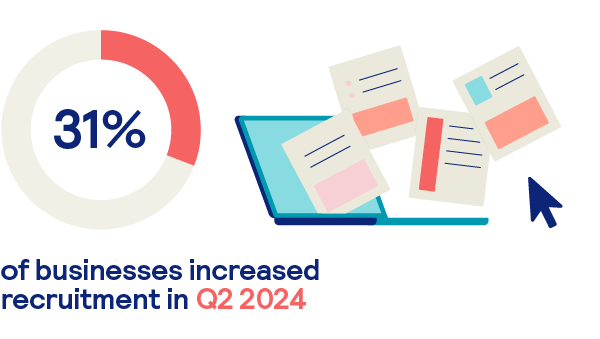
There are more candidates looking for work, but 67% of recruiters found hiring challenging in the past quarter. Positively, this is down from 78% in Q1. With over 1 in 5 working-age people economically inactive, the UK’s workforce is missing workers. Therefore, there are fewer candidates for historically high numbers of vacancies – making hiring difficult in certain industries.
The search for the right talent took 4.9 weeks in Q2, similarly to the previous quarter. The average time to hire is slightly longer for larger organisations (250-999 employees) at 5 weeks, while very large businesses (1,000+ employees) took the longest at 5.5 weeks. Consequently, over half (52%) of recruiters said they struggled with time pressure to fill roles.
The top hiring challenges remain the same as the previous quarter; with recruiters citing finding the right talent (61%), finding talent with the right skills (60%) and meeting candidate salary expectations (54%).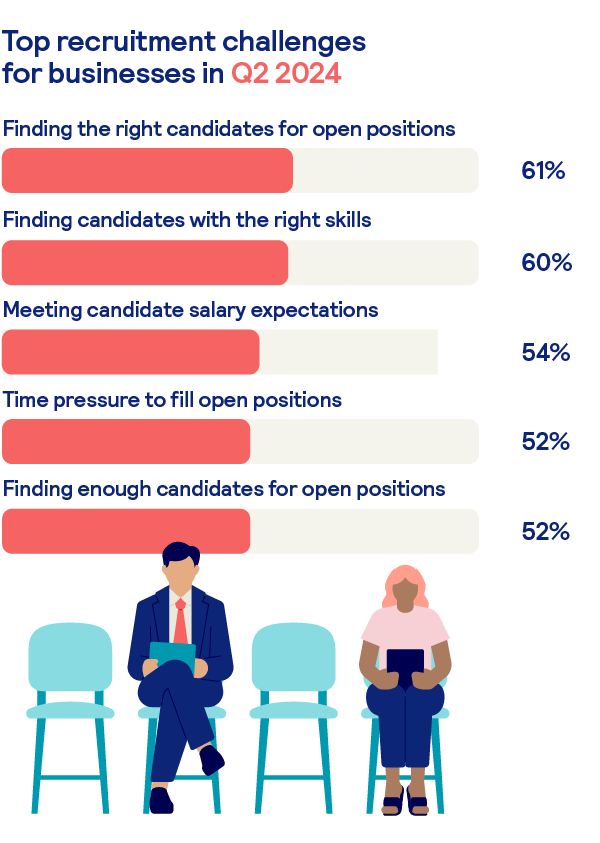
Once again, seeking a higher salary was the number one reason for staff departures (22%). It’s essential for employers to benchmark their salaries and offer competitive compensation packages to attract and retain talent. Employers can use Totaljobs’ Salary Checker and Salary and Benefit Guides to stay up to date with the latest salary and benefit trends to make sure their compensation remains competitive.
Industries that were most likely to have increased recruitment in the second quarter of 2024 were; IT & Telecoms (48%), Finance and Accounting (41%), Real Estate (38%), Construction (36%) and Manufacturing (34%).
Businesses that recruited in Q2 2024 were most likely to recruit for IT & Telecoms (31%), Operations (31%), Customer Service (29%) and HR (24%) and Sales (22%).
Jobseeker confidence in a loosening market
The labour market has been loosening with more people looking for work. However, with high vacancy numbers, candidates get to have their pick. Over two-fifths (42%) of workers say they’ve been approached with job opportunities in Q2, and, on average, they have received 4 job opportunities.
We found that a quarter of workers are actively looking for a new job, and 54% are open to opportunities. Workers say the most important elements when considering a job are work-life balance (96%), job security (94%), paid holiday and time-off allowance (93%), compensation and interesting job content (both 92%).
However, a good job matching one’s skills and requirements doesn’t come easy. The average successful job search takes 4 months (15.7 weeks). 86% of workers say they face difficulties while searching for a job; listing low salary offerings (30%), high competition for positions (23%) and few job openings for the type of jobs they’re interested in (21%) as the biggest hurdles. Despite these difficulties, over half (53%) say they feel confident in finding the right job in the next 3 months and 56% are confident in negotiating the salary they want.
We found that work-life balance is equally important in retention as it tops the list for workers who’d consider remaining in their current role. 94% of workers say they would stay with their current employer if they were to improve work-life balance.
Recruitment in Q3 2024 – Optimistic outlook from recruiters
77% of recruiters are feeling confident about finding the people they need in Q3, up from 74% in Q1. This rise in confidence is due to the optimism around the economy, clarity following the general election and a looser labour market lessening hiring difficulties.
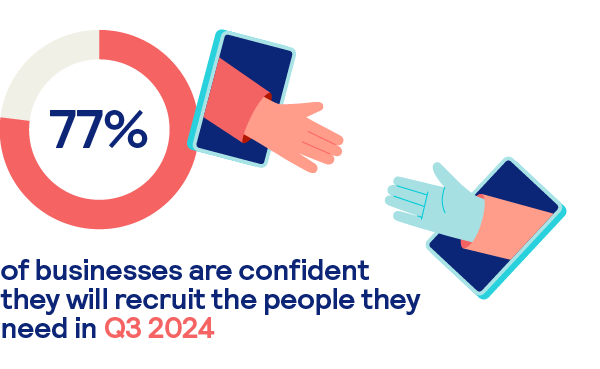
The most confident industries are; IT & Telecoms (94%), Retail, Manufacturing, Finance and Accounting (all 81%), Legal (80%) and Media/Marketing/Advertising (80%). A steady 27% of businesses plan to increase recruitment in Q3, with Construction (34%), IT & Telecoms (33%); Medical & Health and Manufacturing (31%) the most likely.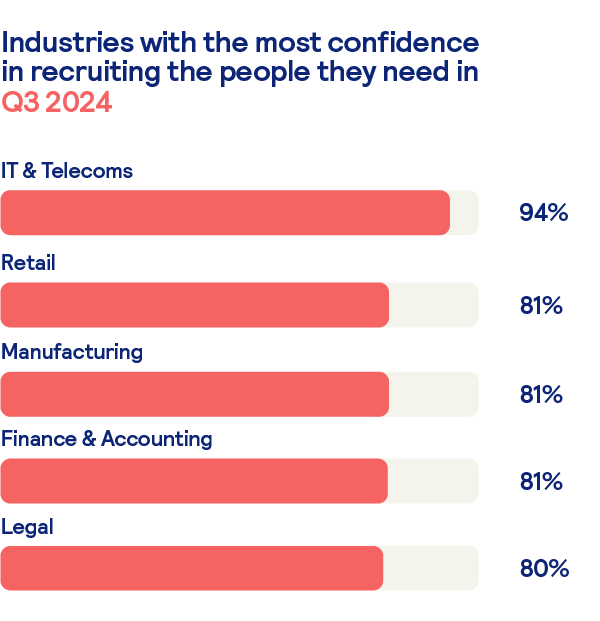
Businesses are generally looking to increase headcount in Q3 2024. Almost 1 in 4 (23%) plan to increase recruitment spend on specialist roles, while 12% will do the same for non-specialist roles. Meanwhile, 16% of businesses plan to increase recruitment for temporary staff or freelancers.
The high interest in green jobs and sustainable businesses
The green jobs market continues to grow. According to ONS estimates, there were 20% more green jobs in 2022 compared to 2020. This is no surprise, considering that climate targets to reduce emissions are approaching and productivity in green sectors is rising. As an example, renewable energy overtook gas production last year.
What is a green job?
Green jobs are defined as “employment in an activity that contributes to protecting or restoring the environment, including those that mitigate or adapt to climate change”; they can be estimated using industry, occupation, and firm approaches. (Office for National Statistics)
Labour party’s win at the 2024 General Election points at ambitious green plans to come, such as; clean energy transition by 2030, high quality jobs in a green economy, making the UK green finance capital of the world, cleaning up UK’s water and more.
The UK is also committed to achieving net zero carbon emissions by 2050, with stringent intermediary targets. However, the green skills gap is the biggest challenge to fulfil these commitments as the country is estimated to face a shortage of around 200,000 skilled workers by 2030.
Positively, 71% of candidates in the UK are interested in working in a green job or for a sustainably minded employer. 67% say they would be more likely to switch to a green job within their current organisation if their employer offered training, and 63% would accept the same at a more sustainably minded company, if given the chance.
Barriers to hiring and training for green roles
Almost a fifth (18%) of businesses are hiring for green roles and skills (like sustainable design, carbon accounting, etc), but the same amount (18%) say they face difficulties acquiring these green skills. Businesses are also struggling to find appropriate green skills training for staff (16%).
Only a quarter (25%) of employers said they already train employees for green skills and are providing opportunities for employees to transition into green roles within the business. Industries where this practice is more common are; IT & Telecoms (29%), Manufacturing (27%), Media/Marketing/Advertising/PR & Sales (26%), and Finance & Accounting (24%).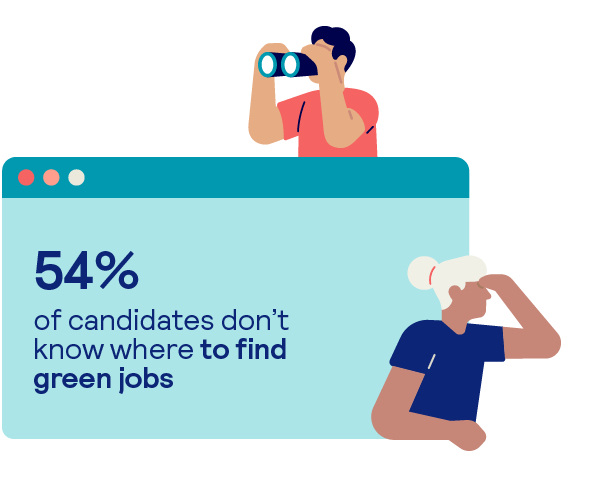
Candidates are also facing difficulties when it comes to green opportunities. 71% of workers say they would be interested in working in a green job or for a sustainably minded employer, but 54% don’t know where to find green jobs. When asked about what their barriers were: 30% of candidates say they can’t afford the pay cut, 24% say they don’t have the right skills or experience, and 23% say they can’t find many green jobs to even apply for.
Despite almost half (48%) of workers saying they know what a ‘green job’ is, only 29% could identify the correct definition among a list of options, pointing to an awareness gap and need for greater education in this space. Sharing information about sustainability initiatives with candidates and defining green jobs can close the awareness gap candidates have.
To make green opportunities more accessible and attractive, candidates expect higher salary offerings (45%), more green jobs in their area (30%), training provided by green businesses (26%), more information about open positions (26%) and clear definitions and expectations of green jobs (25%).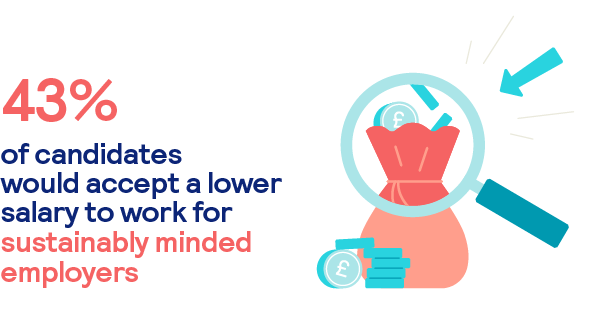
Though pay is an important factor for candidates, over two-fifths (43%) are willing to accept lower salary for sustainability, varying by seniority and education. This raises the question of diversity in the sector, and 74% businesses report less diversity regarding socioeconomic status, age, and gender among applicants for green jobs.
The role of sustainability in recruitment and retention
Candidates aren’t just interested in working in green jobs, but also want and expect greater environmental initiatives from employers in all fields too. Most workers (93%) say it’s important that their employer acts in a sustainable way, so sustainably minded employers are one step ahead when it comes to attracting and retaining talent.
Candidates’ interest in sustainability is noted by recruiters too. 62% of HR decision-makers report that candidates ask about their sustainability initiatives in job interviews. We also found that sustainability is a dealbreaker for 30% of workers, who say they would change their employer if they found out they acted unsustainably.
This shows that sustainability might be becoming a key factor in retention. 2 in 3 (66%) businesses say they’ve received feedback from staff to increase their efforts in addressing climate change, and a similar amount (61%) say their staff are requesting greater visibility and input into sustainability initiatives.
What steps are businesses taking to address sustainability?
Positively, over a third (34%) of businesses have a sustainability framework or policy in place, and 32% are in the process of implementing one. Larger businesses with 5,000 or more employees are more likely to have implemented a sustainability framework, with 51% saying they have one in place. Small to medium businesses, however, seem to be falling behind as only 1 in 4 (26%) say they have a sustainability framework.
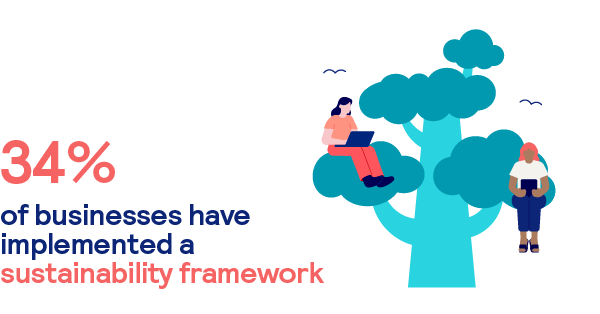
According to businesses that implemented a sustainability framework, the biggest benefits of sustainability initiatives are positive brand recognition (50%), increased employee engagement (47%) and improved talent retention (42%). Therefore, businesses are making more of an effort to communicate their sustainability efforts. We observed a 65% increase since last year in the share of job ads mentioning green terms in Totaljobs’ analysis of job ads data.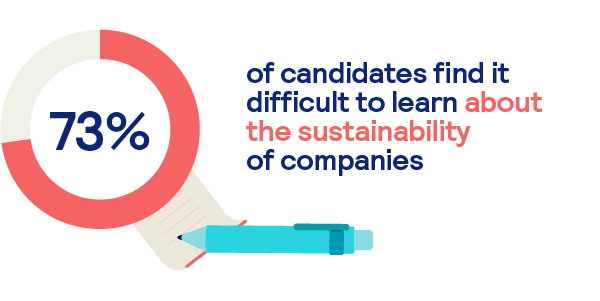
At the same time, there is still a disconnect between candidates and businesses due to missing or misleading information around sustainability. 73% of candidates say they find it difficult to learn about sustainability of organisations. Half of candidates (50%) are also sceptical about greenwashing. This poses a risk for employers as73% of candidates say they would not apply for a job if a potential employer tried to look more environmentally friendly than they actually were.

Integrating authentic Environmental, Social, and Governance (ESG) principles into a business’s people strategy is crucial in attracting and retaining talent. Our research shows that employees are increasingly looking to work for companies that align with their values and are open to having honest conversations about these during the recruitment process. Therefore, having a strong ESG strategy will ensure you’re more attractive to potential candidates as well as help retaining current employees.
Natalie Matalon, Chief People Officer at The Stepstone Group
What do candidates and workers expect from employers regarding sustainability?
According to candidates, an employer is sustainable if they have a long-term strategy for sustainability (33%), a carbon reduction plan (31%), environment-friendly products and services (27%), waste reduction initiatives (27%), and if they use renewable raw materials in production (25%).
And people expect more from their employers. 81% of workers say their employer could be doing more to be sustainable and 80% would welcome sustainability-related restrictions (e.g. business trips are done only by train or limited printing quota). Both up from results in 2023, from 73% and 68%, respectively.
Becoming a sustainable employer
Implement a sustainability framework and report the environmental impact of your business
A sustainability framework can help businesses gain a competitive edge when recruiting talent. 1 in 3 businesses already have a sustainability framework and they report benefits such as:
- Positive brand recognition (50%)
- Increased employee engagement (47%)
- Improve talent retention (42%)
As there are various sustainability frameworks, businesses should think about their own goals and strategically choose a sustainability framework best suited for them.? A sustainability framework would help businesses analyse their environmental impact to understand where to focus their efforts.
For example, at Totaljobs (part of The Stepstone Group), we are using EcoVadis and Ngage assessments to better understand our current sustainability performance and carbon footprint, plus the areas where we can improve.
Communicate your sustainability initiatives with staff and candidates transparently
73% of candidates say they find it difficult to learn about sustainability of organisations. To respond to the strong interest in sustainability, organisations can communicate transparently about their sustainability initiatives to attract talent looking to work for a sustainably minded employer.
Workers and businesses agree that a business can only be sustainable if it has a long-term strategy for sustainability. Therefore, businesses that implement a sustainability framework also need to ensure they have a step-by-step plan to achieve long-term green commitments. By communicating these plans to employees and potential candidates transparently, they can improve talent attraction and retention.
Retain and attract talent by retraining or upskilling staff in green skills
A quarter of employers already train employees for green skills and are providing opportunities for employees to transition into green roles within the business. Retraining or upskilling staff is beneficial for employers to keep up with green transition, as well as attract and retain the talent they need now and will need in the future.

Further reading
How to enhance learning and development at work
About the research
All figures, unless otherwise stated, are from a survey conducted with Opinium Research. Total sample size was 1,000 HR decision-makers and 3,000 part-time and full-time workers in the UK. Fieldwork was undertaken between 5th – 18th June 2024 and 30th May – 10th June 2024, respectively. The survey was carried out online.
As we work to improve our findings and insights, we recruited a new panel of HR decision makers representing different industries and business sizes. We have also updated one of our recurring questions around the average time to hire*, specifying this period from ‘advertising a role’ to ‘filling a role.’
Explore articles
Receive the latest recruitment resources and
advice to boost your hiring
By providing us with your details you agree to our privacy policy and for us to keep you updated with the latest news, events,
and special offers from Totaljobs.






